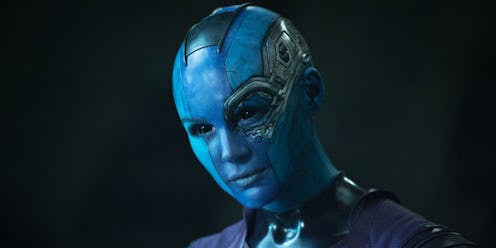Entertainment
The Feminist Lesson Karen Gillan Thinks We Can Learn From 'Guardians 2'

Karen Gillian is nothing like her blue, increasingly-robotic character Nebula in the Guardians of the Galaxy films. Nebula's hostile, aggressive personality is galaxies away from the Scottish actor's own demeanor. ("It feels really removed from who I am," she says). Sitting down with Gillian to talk Guardians Vol. 2, the red-haired actor is lively, and bubbling with enthusiasm to chat about the sequel to 2014's hit. And she's particularly keen to discuss Nebula's tumultuous relationship with her sister, Gamora (Zoe Saldana), as it's both central to the sequel and represents an unfortunate reality in Hollywood: Women are so often pitted against their fellow women. (Spoilers for Guardians of the Galaxy 2 ahead.)
"There is sibling rivalry going on," the actor says of the film's adoptive sisters. "In the first film we knew [Nebula] had an issue with her sister, but we didn't know the extent of it or why. In this movie, her relationship with Gamora is explored in depth."
Specifically, audiences will learn about the characters' childhood with their abusive father, Thanos (who, for the record, doesn't make an appearance in Guardians 2). "These sisters have had a really traumatizing history with their father. He stole them as infants and then brought them together. He was a really bad dad, and they have some serious daddy issues."
As a result of their awful upbringing, Nebula developed negative, hateful feelings towards her sister, as the pair were forced to battle one another regularly. According to a powerful monologue delivered by Gillian in Vol. 2, Nebula consistently lost these battles, so after every fight, her father replaced a part of her body with machinery to better increase her odds of winning.
"Nebula is the overlooked, jealous sister. I don't think Gamora realized the affect she was having on Nebula. Finally they confront [their issues] in this movie, and it turns into this emotional explosion between the two of them."
Gillian is an only child, and she admits that she has no idea what this level of antagonism towards another woman must feel like. "As an only child you're not really overlooked. You're actually given quite a lot of attention from your parents," she says. "I have so many amazing female friendships who are [like] sisters. I definitely feel like I have a taste of what it's like to have a sibling, but I don't fully understand it."
Though she has positive relationships with her female peers she does notice a trend towards women being put in competition other women in Hollywood — as if there's only one seat at the table for a working female actor. "It's so annoying that women are pitted against each other because it doesn't need to be like that," she says. "I know that it's very prominent in our society, and I see it happen to other people all the time."
According to the 29-year-old, a way to combat the idea of dangerous competitiveness between women is to take on roles that promote positive relationships between women. On the surface, Nebula and Gamora's relationship in Guardians of the Galaxy 2 — which has the duo hurling intergalactic bullets at one another for most of the film — may not seem like an example of a healthy sisterhood, but by the end of the film, they've (mostly) worked out their differences, directing their hurt towards their father instead of each other.
Because of their amicable resolution, this "happy ending" for the sisters should be an example to Hollywood. It's no secret that women are paid less, treated worse, and generally have a harder time getting roles as they age in the film industry. With the odds stacked against them, women actors need allies, not enemies. Just like Gamora and Nebula, women who work side-by-side can accomplish a hell of a lot more than women who have to fight each other — while also battling the patriarchy.
"It feels exciting to have an array of female characters that are so well-written and well-rounded. I feel like we're getting such a selection of women [in Guardians], which is a step in the right direction."
Gamora and Nebula may historically have bad blood, but their eventual empathy and understanding of one another is a shining example of what we need to see in Hollywood — on and off the screen.